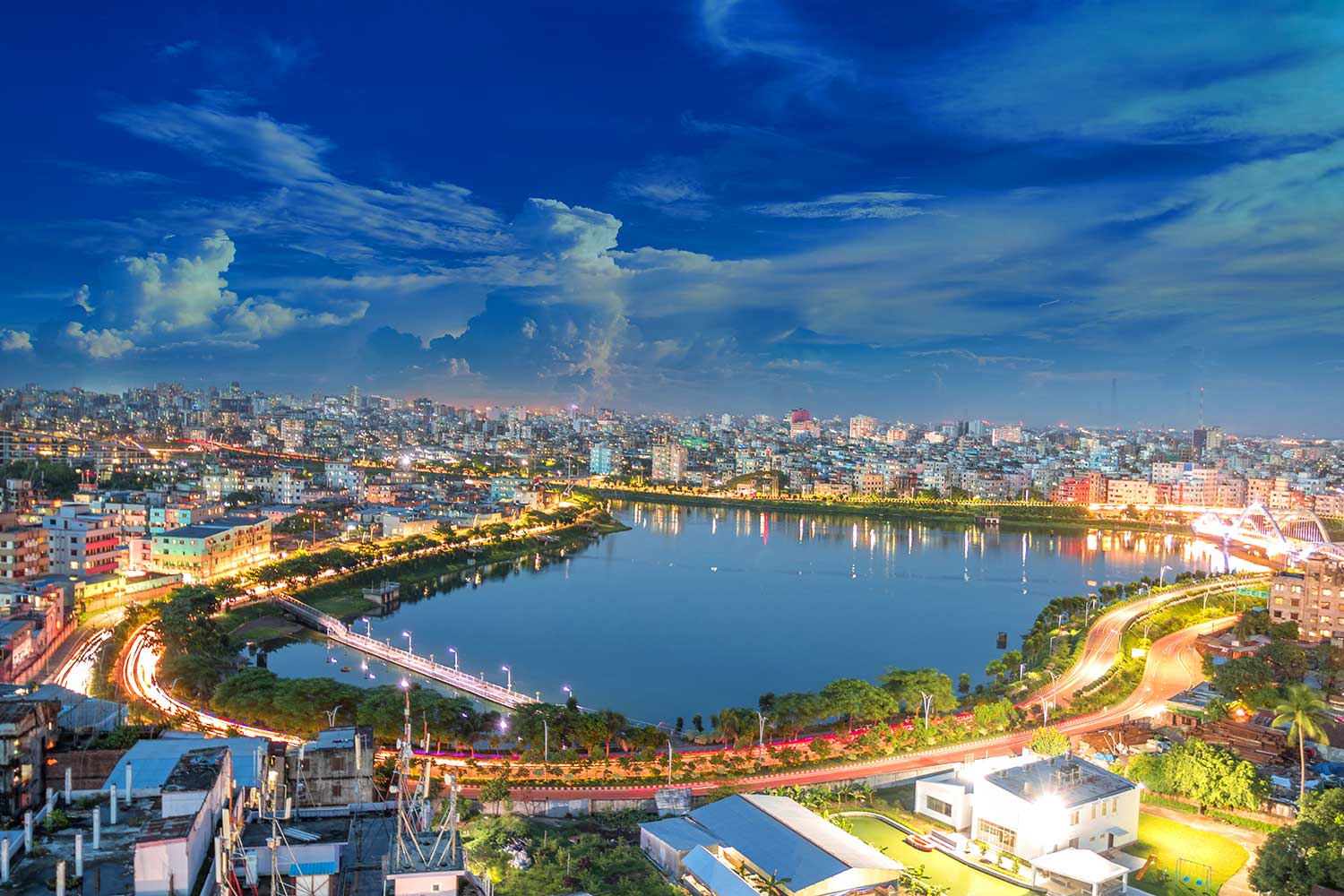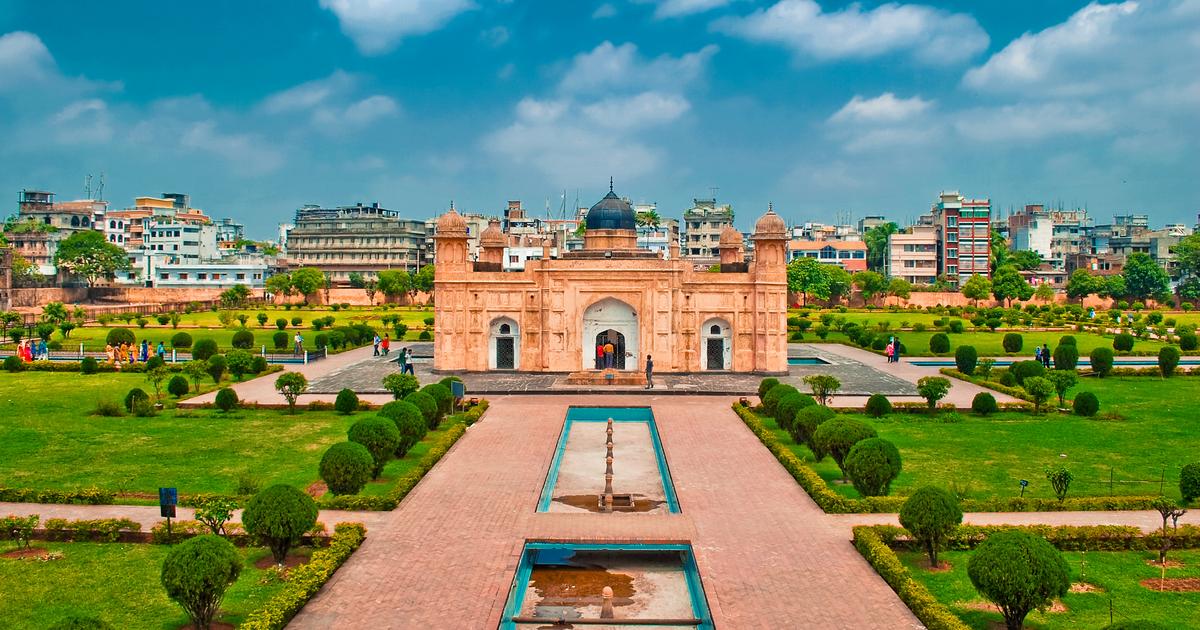



Dhaka is the capital city of Bangladesh, in southern Asia. Set beside the Buriganga River, it’s at the center of national government, trade and culture. The 17th-century old city was the Mughal capital of Bengal, and many palaces and mosques remain. American architect Louis Khan’s National Parliament House complex typifies the huge, fast-growing modern metropolis. ― Google
Known for: Rich Mughal history, chaotic charm, rickshaw culture, street food, and growing tech and art scenes
Location: Central Bangladesh, on the banks of the Buriganga River
November to February (Winter):
Cool and dry — ideal for sightseeing (~15°C–25°C).
March to May (Spring/Early Summer):
Warm and humid, but manageable.
June to October (Monsoon):
Heavy rain, humidity, and traffic issues — not ideal for travel.
By Air:
Hazrat Shahjalal International Airport (DAC) — connected to major cities across Asia, Europe, and the Middle East.
By Road/Train:
Connected to all major Bangladeshi cities (e.g., Chattogram, Sylhet, Khulna) by buses and trains.
Public and private operators are available; book early for AC classes.
Lalbagh Fort:
An unfinished 17th-century Mughal fort with gardens, a mosque, and a museum.
Ahsan Manzil (Pink Palace):
Former residence of the Nawabs of Dhaka — now a museum by the river.
Star Mosque (Tara Masjid):
Beautiful mosque decorated with Japanese and English tiles.
Dhakeshwari Temple:
The national Hindu temple of Bangladesh — vibrant and spiritual.
National Parliament House (Jatiya Sangsad Bhaban):
Architectural masterpiece by Louis Kahn — iconic and modernist.
Liberation War Museum:
Moving and well-curated tribute to Bangladesh’s fight for independence.
Bangladesh National Museum:
Covers natural history, art, and the nation's cultural heritage.
Sonargaon (Day trip):
Historic capital with ancient ruins, folk museum, and colonial buildings.
New Market & Bongo Bazaar:
Great for local shopping, clothes, handicrafts, and street food.
Ride a cycle-rickshaw:
Best way to explore Old Dhaka’s narrow lanes.
Boat ride on the Buriganga River:
Experience Dhaka’s river culture from Sadarghat.
Explore Old Dhaka:
Bustling alleys, spicy food, and colonial architecture.
Attend a cultural show:
At Shilpakala Academy or Bengal Boi (cultural hub + bookstore).
Sample Dhakaiya cuisine (see food section).
Luxury:
The Westin Dhaka (Gulshan)
InterContinental Dhaka (Ramna)
Le Méridien Dhaka (near airport)
Mid-range:
Hotel Tropical Daisy (Gulshan-2)
Amari Dhaka
Lakeshore Hotel
Budget:
Hotel 71 (Motijheel)
FARS Hotel & Resorts
Gulshan, Banani, and Dhanmondi are safer and cleaner areas for tourists.
Must-Try Local Dishes:
Kacchi Biryani (Haji, Fakruddin, or Star Kacchi)
Beef Tehari
Bhuna Khichuri
Fuchka (pani puri), Chotpoti, and Jhalmuri (street food)
Hilsa fish curry
Roshogolla and Mishti Doi (sweets)
Top Restaurants:
Saltz (Gulshan): Seafood and Bengali cuisine
Sajna: Desi buffet
Pandar Ghor: Authentic Dhakaiya dishes
Izumi: Best Japanese in Dhaka
The Pit Grill: BBQ lovers' favorite
Language: Bengali (Bangla); English widely understood in urban areas
Religion: Predominantly Muslim, but with vibrant Hindu, Buddhist, and Christian minorities
Dress code: Modest dress is appreciated — especially in Old Dhaka and religious sites
Etiquette: Remove shoes before entering homes/mosques, use right hand for eating, greet with “Assalamu Alaikum”
Traffic is intense — plan with time buffers.
Stay hydrated — bottled water only.
Use ride-sharing apps like Uber or Pathao for safe travel.
Currency: Bangladeshi Taka (BDT) — cash is king in many places.
Power outages can occur — carry a power bank.
Air quality can be poor — consider a mask if sensitive.
Day 1:
Explore Old Dhaka → Lalbagh Fort → Ahsan Manzil → Rickshaw tour → Dinner at Star Kacchi
Day 2:
Liberation War Museum → Parliament House (exterior) → Shilpakala Academy or museum → Dhakeshwari Temple → New Market shopping
Day 3:
Day trip to Sonargaon → Visit Panam City ruins → Return for dinner in Gulshan